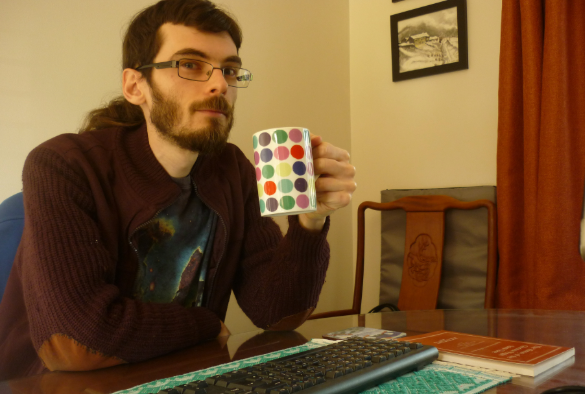Andrew Foster is a PhD student with the Institute of Irish Studies, which also funded his research. He has been researching English and Irish nuns in the seventeenth century, both in and out of exile, for the past five years. Recently, he has passed his viva and is looking forward to postdoctoral research.
Why did I become a historian?
I’ve always been interested in stories, and I eventually discovered that some of best ones tend to be from real life. I have a love of writing – not just for the experience of a story, but the logistics behind how the story, characters, and setting all function and behave. As I learned more about past events from real life, I realised that the study of History gave me that same excitement. Not only that, but it gave me a better understanding of how the world around me worked and came to be the way it is. However, no matter how much evidence or understanding we have, there’s no way of truly knowing everything about the past, and the picture only gets murkier as more evidence is lost.
That’s why I like to think of a historian as a storyteller, even if the purpose of the storytelling is different from that of a literary author. You need to build the best framework for understanding the past that you possibly can, one based on evidence and analysis, but in the end, you still have to tell a tale of why you think it happened. That’s why I decided to study History for as long as I have.
What I study – early modern nuns, in and out of exile
For the past five years, I’ve been studying the histories and impact of English and Irish nuns in the seventeenth century, both in and out of exile. The foundation of convents was forbidden in both countries, owing to the dominance of Reformation policies and increasing fear of Catholic enemies in England (which had control over Ireland as a colony in this period). Instead of forming convents in their homeland, English Catholic women began to leave for mainland Europe (mainly France and the Spanish-controlled Netherlands) in the late sixteenth and early seventeenth centuries, forming exile convents that grew in popularity all the way up to the French revolution in 1789.
Irish women did the same, but with more limited success in forming successful exile convents (exceptions include the Bom Sucesso convent in Lisbon, which survived through several centuries up to August 2016)! Many chose to join English exile convents, enjoying a mixed reception depending on the convent communities, but the Irish nuns also returned to found convents in their homeland. In 1629, the Irish Poor Clares left their convents in Dunkirk and Nieuwpoort for Dublin, then establishing the Bethlehem convent in Athlone in 1631. These Irish nuns – a group of formerly exiled women led by the sisters Eleanor and Cecily Dillon – were pioneers in rebuilding convents and female religious life in Ireland, which flourished even during the wars of the 1640s until the end of the Cromwellian conquest of Irelandin 1653.
Why does this matter?
The study of early modern nuns is part of Ireland’s development into a predominantly Catholic country, even in the face of consistent, often violent English (and Protestant) suppression. Catholicism wasn’t just a religious choice in this period, and for Ireland it was also a political stance which set them apart from their colonial oppressors who sought to erase their Irish identities. Such examples include plantations of English and Scottish settlers in land once run by Irish clans, legislation forbidding land ownership for Irish figures, restrictions on Gaelic attire and language, and even the deliberate famine and slaughter of Irish civilians in cases of conflict. This closeness between Catholicism and Irishness wasn’t always like this, so understanding how it came to be helps us to understand why such a connection remained so strong even into the twenty-first century.
Ireland’s history is also a key part of English history too, since they were tied both politically and socially in this period, and events in one country also influenced another. When I was in school, I learned a lot about key points in English history like the First World War or Henry Tudor’s reign, but I was never really taught about Irish or Scottish or Welsh history, even though these countries have close ties to England to this day. It’s also easy to forget in this period that several English regions remained mostly Catholic (usually in the north of England such as Lancashire and Yorkshire – see the work of Peter Marshall and Alexandra Walsham), so understanding the stories of English Catholics also gives us a deeper knowledge of English history. My PhD research was a chance to understand a history that I think gets overlooked too often.
